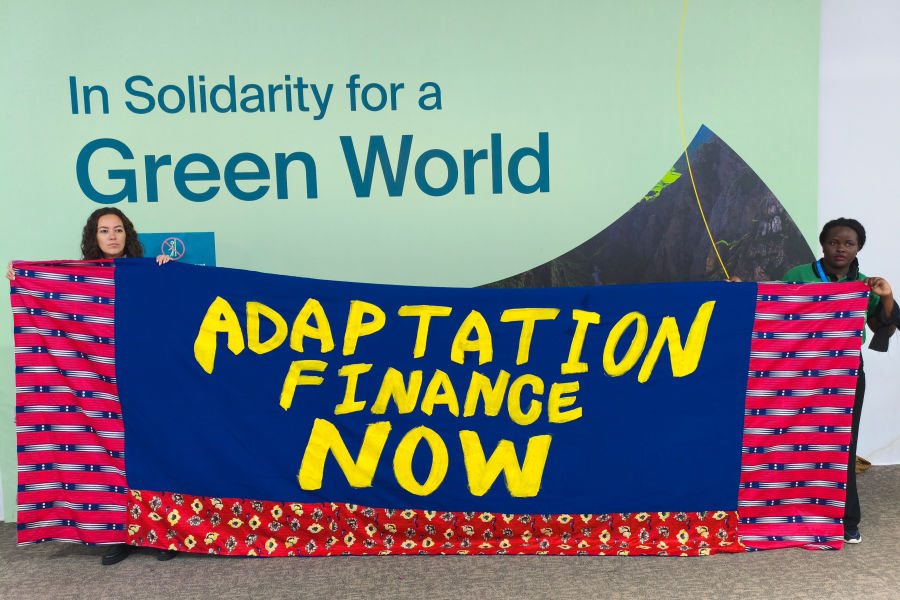COP29 continues to struggle over loan vs compensation debate
Bangladesh remains vocal over grant-based climate finance

Yasir Wardad from Baku, Azerbaijan
Published :
Updated :

The 29th annual Conference of the Parties (COP29), which began on November 11 and is set to conclude on Friday, continues to leave lingering doubts over its outcomes.
As the conference is set to wrap up, frustration grows as no definitive decision has been made regarding climate finance until Thursday noon.
The core aim of COP29 is to secure financial assistance for developing nations from wealthier countries, which are mainly responsible for the global climate crisis.
However, the issue remains unresolved, leaving key questions still hanging.
In the final hours, numbers of countries and organisations held protests, urging world leaders to release climate funds for the countries most affected by climate change.
Bangladesh, too, has sought international cooperation, calling for immediate financial support to build a more sustainable and resilient world.
Climate activists and finance experts climate warns that without these funds, the planet's future could be in peril.
The UN Climate Organisation unveiled a new proposal during the conference, aimed at outlining the financial contributions that rich nations should make to help poorer countries mitigate and adapt to climate change.
However, progress has been slow, and significant decisions remain pending, said Team Manager of Just Energy Transition at ActionAid Abul Kalam Azad.
He said the latest draft of the proposal was presented hours after the original deadline, and many crucial issues, such as how to calculate annual financial assistance, the distribution process, and the sources of these funds, are still unclear.
This has led to concerns about the timely conclusion of COP29, despite rumors that the conference might be extended, he said.
Interestingly, for the first time in its 28-year history, COP concluded on time.
Island nations, which are particularly vulnerable to rising sea levels, have called for an immediate end to the use of fossil fuels, citing the existential threats they face due to climate change.
Li Shuo, Director of China Climate Hub at the Asia Society Policy Institute (ASPI), said that the current draft proposals indicate a worsening climate crisis with little room for compromise.
Economists at a UN meeting last week suggested that developing countries need at least $1.0 trillion annually by 2030 to effectively tackle climate change.
He said the 10-page draft document shows the conflicting positions of developed and developing countries.
One key point is that funding should primarily come in the form of grants, not loans.
Rich nations, however, have argued that climate finance should not only consist of grants but also include other forms of financial support.
Despite these discussions, no party has proposed a specific amount of funding, with many leaving the total contribution marked as “X", executive director of Coast Foundation, Rezaul Karim Chowdhury, said.
He said the draft proposal fails to provide clarity on the necessary amount for future climate finance.
Sharif Jamil, Water Keepers Bangladesh coordinator, said major donors, including the European Union, have expressed reluctance to disclose how much they are willing to commit until key financial structures and other issues are clarified.
The debate between rich and poor nations over the nature and size of the climate finance fund remains one of COP29's most contentious issues, he said.
Amid these ongoing discussions, Syeda Rizwana Hasan, environment, forests, climate change, and water resources adviser called for a grant-based approach to funding in sectors such as adaptation, mitigation, and compensation.
Speaking at the New Collective Quantified Goals (NCQG) session on Thursday at COP29, she has focused on the need for fair, transparent, and equitable climate finance.
She pointed out that the proposed targets fail to account for the specific needs and realities of Least Developed Countries (LDCs), and stressed that at least 50 per cent of the funds should be allocated for adaptation efforts.
Bangladesh, along with the G77, LDCs, and Small Island Developing States (SIDS), has been advocating for a robust and inclusive NCQG framework.
Rizwana Hasan also criticised the draft for linking grants to mobilised finance, expressing concerns over the fairness of this approach.
She rejected the second option in the draft, which includes all types of financing, investments, and even domestic resources from developing countries, arguing that it contradicts the principles of equity and the Paris Agreement’s common but differentiated responsibility.
Additionally, she puts emphasis on debt relief for developing countries, which cannot afford further financial burdens in the face of the climate crisis.
In a separate development, Syeda Rizwana Hasan held a meeting with the Environment Secretaries of Nepal and Bhutan at the Bangladesh Pavilion of COP29 venue.
The discussion centered on regional cooperation to tackle climate change.
Rizwana Hasan suggested that collaboration in sectors such as power, agriculture, forests, and rivers could provide valuable opportunities for joint initiatives.
Sharing innovative solutions, such as community-based seed banks and resilient crop varieties, could bring significant benefits with minimal investment, said Ms Hasan.
These areas, she noted, have low political barriers and are ideal for cooperation and exchange of knowledge across the region, she said.
tonmoy.wardad@gmail.com


 For all latest news, follow The Financial Express Google News channel.
For all latest news, follow The Financial Express Google News channel.